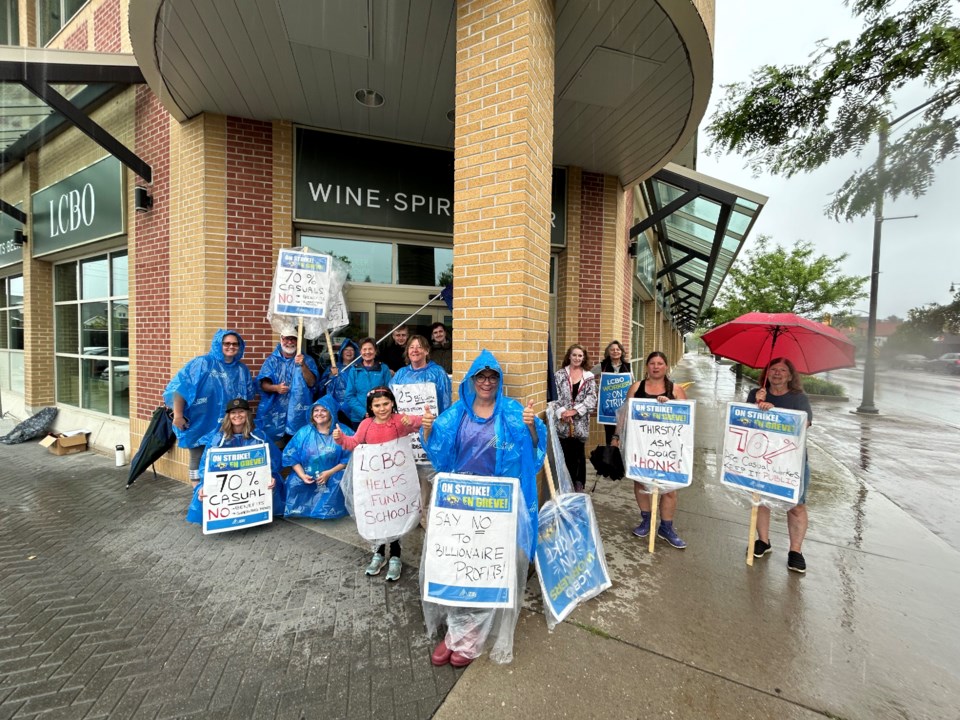It's been five days Ontario Public Service Employees Union employees at LCBO stores walked off the job.
In Collingwood, LCBO clerk Mike Murray has been organizing the picket schedule. There are between two- and three-dozen workers picketing at the Collingwood location each day from 11 a.m. to 6 p.m. On Wednesday, the strikers were keeping mostly dry by wearing blue plastic ponchos printed with the OPSEU logo on it. Their picket signs were covered in clear plastic bags.
"We'd all rather be working, but we're all doing this as our part to try to help get a speedy resolution," said Murray.
The two main issues, said Murray, is that OPSEU is opposed to what they say is a push toward privatization of beer, wine and liquor sales by the Ontario government and the union wants better job security for casual workers, which make up about 70 per cent of the work force.
"We want to keep [alcohol sales] as publicly owned and make the funds that are generated available for public use," said Murray. "That's the model that's been in place for 100 years and ... we think it's a better way to go."
OPSEU, which represents Ontario liquor store workers, continues to call on Doug Ford's provincial government to cancel its plan to further open up alcohol sales at non-LCBO retailers.
Thousands of workers at the Liquor Control Board of Ontario (LCBO) walked off the job Friday, prompting the LCBO to close stores across the province. Workers are picketing in front of stores across the province, and in front of warehouses, where they've been slowing down delivery trucks.
The union believes Premier Doug Ford's plan to open up the alcohol sales market will lead to major job losses.
It does not want ready-to-drink cocktails sold outside LCBO stores, wants the province to guarantee its jobs, as well as wage increases, and wants more permanent rather than casual positions.
Finance Minister Peter Bethlenfalvy has said the government is "more committed than ever" to its alcohol expansion plans in order to give Ontarians more choice and convenience.
Indeed, Premier Doug Ford stars in a video he posted on his X (formerly Twitter) account wherein he's barbecuing hamburgers and then punching the keys on a laptop to pull up a new interactive map of non-LCBO locations in Ontario where beer, wine and spirits are still being sold.
The first step of the expansion plan is set to start in less than a month, when grocery stores that already sell beer and wine will be able to sell ready-to-drink cocktails. Convenience stores can start selling beer, wine, cider and ready-to-drink cocktails on Sept. 5.
Nearly 3,000 convenience stores have already signed up to sell alcohol.
The province said it does not want to privatize the LCBO, rather the expansion is about giving people more choice and more convenience to buy alcohol. Ford has said it is time "to treat people like adults."
The LCBO is a cash cow for the province, netting some $2.5 billion in 2022-23, or about $159 per person, reports The Canadian Press.
In front of the Collingwood store on Wednesday, Murray noted that the province-wide strike is also about LCBO workers, because 70 per cent of them are "casual," which means no guaranteed hours. He said he knows casual workers with second and third jobs because their casual employment is not enough to live on.
"They have either no or very limited access to benefits," said Murray, noting the union is suggesting casual workers be switched to permanent part-time status with guaranteed part-time hours and proportional access to benefits.
The LCBO has said its last contract offer included wage increases and converting several hundred part-time jobs to full-time positions.
"Both of the issues do tie back directly to job security," said Murray.
He noted the union is proposing expanded access and availability in LCBO-run stores.
"Instead of going down that privatization path, where the profits would go to Loblaws, Circle K, Costco, Walmart and what have you, they would stay within the public realm and be available for public purposes," said Murray.
The ultimate decision, noted Murray, rests with the province and Premier Doug Ford.
"We're asking anybody who has an opinion if they would please contact Doug Ford's office, whether by phone or email, and let him know what they think," said Murray.
"It's going to be public opinion that's going to resolve this situation one way or the other," said Murray. "They might as well get right to the decisionmakers and let Doug Ford know."
The Collingwood worker said he and others would like to be back to work as soon as possible.
The LCBO has said they will reopen stores after two weeks, but only about 30 of the 700 in Ontario and only for a few days a week on reduced hours.
Murray thinks this plan will result in lines that made "COVID lines look like a Sunday picnic."
You can find contact information for the Premier's office online here.
With files from The Canadian Press
